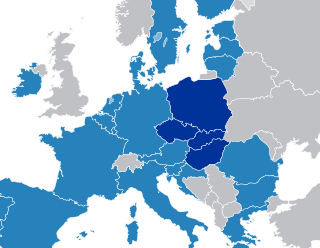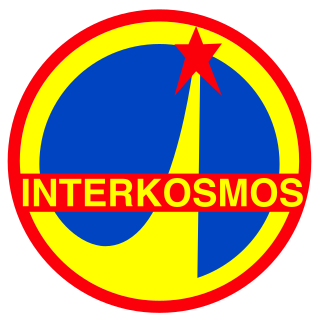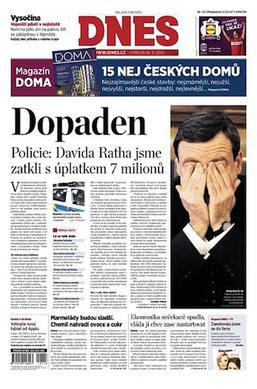
The Czech Republic, also known as Czechia, is a landlocked country in Central Europe. Historically known as Bohemia, it is bordered by Austria to the south, Germany to the west, Poland to the northeast, and Slovakia to the southeast. The Czech Republic has a hilly landscape that covers an area of 78,871 square kilometers (30,452 sq mi) with a mostly temperate continental and oceanic climate. The capital and largest city is Prague; other major cities and urban areas include Brno, Ostrava, Plzeň and Liberec.

The Czech Armed Forces, also known as the Czech Army, is the military service responsible for the defence of the Czech Republic as part of the Armed Forces of the Czech Republic alongside the Military Office of the President of the Republic and the Castle Guard. The army consists of the General Staff, the Land Forces, the Air Force and support units.

The Czech Republic is a Central European country, a member of the European Union, the Organisation for Economic Co-operation and Development (OECD), Organization for Security and Co-operation in Europe (OSCE), the North Atlantic Treaty Organization (NATO), the United Nations. It entertains diplomatic relations with 191 countries of the world, around half of which maintain a resident embassy in the Czech capital city, Prague.
The Slovak Republic has been a member of European Union since 2004. Slovakia has been an active participant in U.S.- and NATO-led military actions. There is a joint Czech-Slovak peacekeeping force in Kosovo. After the September 11, 2001 Terrorist Attack on the United States, the government opened its airspace to coalition planes. In June 2002, Slovakia announced that they would send an engineering brigade to Afghanistan.

The Visegrád Group is a cultural and political alliance of four Central European countries: the Czech Republic, Hungary, Poland, and Slovakia. The alliance aims to advance co-operation in military, economic, cultural and energy affairs, and to further their integration with the EU. All four states are also members of the European Union (EU), the North Atlantic Treaty Organization (NATO), and the Bucharest Nine (B9).

The Czechs, or the Czech people, are a West Slavic ethnic group and a nation native to the Czech Republic in Central Europe, who share a common ancestry, culture, history, and the Czech language.

Interkosmos was a Soviet space program, designed to help the Soviet Union's allies with crewed and uncrewed space missions.

Victory in Europe Day is the day celebrating the formal acceptance by the Allies of World War II of Germany's unconditional surrender of its armed forces on Tuesday, 8 May 1945; it marked the official end of World War II in Europe in the Eastern Front, with the last known shots fired on 11 May. Russia and some former Soviet countries celebrate on 9 May, as Germany's unconditional surrender entered into force at 23:01 on 8 May Central European Summer Time; this corresponded with 00:01 on 9 May in Moscow Time.

The Czech Republic national football team, recognised by FIFA as Czechia, represents the Czech Republic in men's international football. The team is controlled by the Football Association of the Czech Republic (FAČR). Historically, the team participated in FIFA and UEFA competitions as Bohemia and Czechoslovakia.

Mladá fronta Dnes, also known as MF DNES or simply Dnes (Today), is a daily newspaper based in the Czech Republic. As of 2016, it is the second-largest Czech newspaper, after the tabloid Blesk.

The history of the Jews in the Czech lands, historically the Lands of the Bohemian Crown, including the modern Czech Republic, goes back many centuries. There is evidence that Jews have lived in Moravia and Bohemia since as early as the 10th century. Jewish communities flourished here specifically in the 16th and 17th centuries, and again in the late 19th and early 20th centuries. Local Jews were mostly murdered in the Holocaust, or exiled at various points. As of 2021, there were only about 2,300 Jews estimated to be living in the Czech Republic.

Vietnamese people in the Czech Republic, including citizens and non-citizens, are the third-largest ethnic minority in the country overall, numbering more than 83,000 people according to the 2011 census.
Czech Canadians are Canadian citizens of Czech ancestry or Czech-born people who reside in Canada. They were frequently called Bohemian Canadians until the late 19th century. According to the 2021 Canadian census, there were 98,925 Canadians of full or partial Czech descent.
Czechs in the United Kingdom refers to the phenomenon of Czech people migrating to the United Kingdom from the Czech Republic or from the political entities that preceded it, such as Czechoslovakia. There are some people in the UK who were either born in the Czech lands or have Czech ancestry, some of whom descended from Jewish refugees who arrived during World War II.

The Czech Republic national men's volleyball team is controlled by the Czech Volleyball Federation, which represents the country in international competitions and friendly matches. Czech Republic is ranked 22nd in the FIVB world ranking.

Czech Republic–United Kingdom relations are foreign relations between the Czech Republic and the United Kingdom. The Czech Republic has an embassy in London and four honorary consulates. The United Kingdom has an embassy in Prague.
Czech Australians are Australian citizens of Czech ancestry. Most Czech immigrants to Australia came after World War II and 1968–1969. Most recently the biggest influx is of students coming to Australia to study English and to find work. Many of them are deciding to stay by gaining permanent residency. According to 2016 census figures, around 24,500 Australians identify as having Czech ancestry, mostly in Melbourne and Sydney. In the 1960s and 1970s, two of the most successful Australian soccer clubs were Slavia Melbourne and Sydney FC Prague.
Energy in the Czech Republic describes energy and electricity production, consumption and import in the Czech Republic.

Lycée français de Prague is a French international school in Smíchov, District 5, Prague, Czech Republic. The school covers pre-maternelle, until lycée.

The 2017 European Women Basketball Championship, commonly called EuroBasket Women 2017, was the 36th edition of the continental tournament in women's basketball, sanctioned by the FIBA Europe. The tournament was awarded to Czech Republic after winning the bid to Serbia. The tournament also serves as a qualification for the 2018 FIBA Women's Basketball World Cup in Spain, with the top five nations qualifying. As hosts Spain finished in the top five, the sixth placed team also qualified.
















